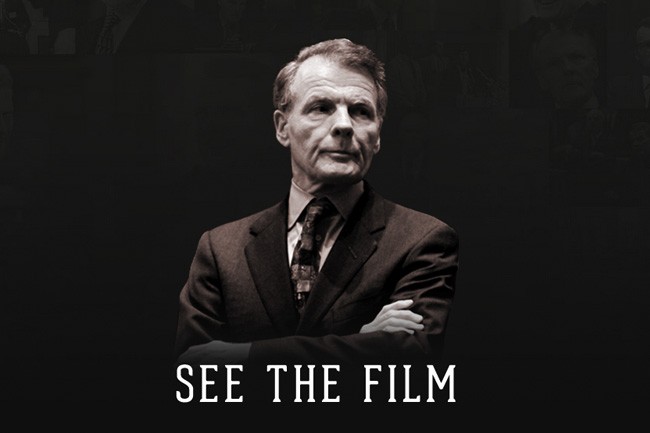Madigan sticks to the facts, but lacks some context
[
{
"name": "Air - MedRect Combo - Inline Content 1",
"component": "11490391",
"insertPoint": "3",
"requiredCountToDisplay": "1",
"parentWrapperClass": "fdn-ads-inline-content-block"
},{
"name": "Air - MedRect Combo - Inline Content 2",
"component": "11490392",
"insertPoint": "7",
"requiredCountToDisplay": "5",
"parentWrapperClass": "fdn-ads-inline-content-block"
},{
"name": "Air - MedRect Combo - Inline Content 3",
"component": "11490393",
"insertPoint": "12",
"requiredCountToDisplay": "9",
"parentWrapperClass": "fdn-ads-inline-content-block"
}
]
Anyone who watches Illinois politics knows that the most powerful man in the state isn’t the governor. Not everyone can agree on whether that’s good or bad.
The Illinois Policy Institute certainly sees it as a negative. That’s why the conservative group wrote and commissioned the controversial new film Madigan: Power. Privilege. Politics. Styled as a documentary, the film focuses on the real power in the Illinois Statehouse: Speaker Michael Madigan. IPI premiered the film in Springfield on Oct. 12 at the Legacy Theatre, selling about 150 tickets. The group declined to say how much the film cost to make.
Before the film’s release, it was somewhat tainted by allegations that some people were “duped” into doing interviews. For example, Rich Miller, author of the political blog Capitol Fax, told his readers that he didn’t know the Illinois Policy Institute was behind the film until after he’d already been interviewed, and that he wouldn’t have appeared in the film if he had known. IPI responded that the film crew told Miller about the group’s involvement, but the film’s director later said the film crew didn’t actually know.
Strictly speaking, the film really is a documentary. It’s based on well-established facts about Michael Madigan, his political connections and his alleged conflicts of interest spanning 45 years in the Illinois House.
In another sense, however, Madigan is an extended political advertisement. It was released just ahead of the extremely contentious November general election, in which Republican Gov. Bruce Rauner has sought to hang all of Illinois’ problems around Madigan’s neck in hopes of stirring up voters against the Democrats. The film lacks some crucial context about Illinois history which, while not completely absolving Madigan, would at least mitigate some of his blame for the state’s woes.
The film dings Madigan with allegations of widespread patronage, rigging the redistricting process, using the infamous House Rules Committee to kill bills without a vote and using his connections and position in state government to profit his law practice, which handles property tax appeals in Cook County. Madigan’s most recent primary opponent for his House seat, Jason Gonzales, accuses Madigan in the film of unfair campaign tactics, including repeatedly bringing up Gonzales’ troubled youth and propping up other fake candidates to dilute any anti-Madigan votes. Early in the film, Gonzales even references death threats, although it’s not clear whether he’s talking about a specific incident.
Also laid at Madigan’s feet is blame for the state budget crisis and massive unfunded pension liability. Certainly, the House speaker deserves a portion of that blame; he oversaw years of missed pension payments, and has passed unbalanced budget after unbalanced budget.
Absent, however, is any mention of Republican culpability in the pension debacle, or the fact that inflation consistently outpaces state revenues, forcing Illinois to make do with less spending power. While it’s easy to blame Madigan for Illinois’ frequent budget deficits, he could conversely be blamed for not raising taxes enough to account for inflation.
The film also doesn’t bring up that Rauner’s non-budget “Turnaround Agenda” held up progress on passing a state budget for an entire fiscal year. Madigan likes to say he never had difficulty negotiating with any other Republican governors over the past 40 years. Of course, these are fundamentally partisan quibbles which one wouldn’t expect to see addressed in a long-form political ad.
In terms of production value, Madigan is quite polished, with several neat drone shots over Chicago’s skyline, expertly lit interviews and plenty of old footage of the speaker himself cut in for effect. The one place the film loses points here is by having an actor portray an alleged patronage worker hired at Madigan’s behest. The actor – not the actual worker himself – is unnecessarily silhouetted and his voice altered, making for an overly dramatic distraction.
Madigan ends with an excerpt from President Barack Obama’s speech in Springfield earlier this year. While it’s likely meant as a call to action against the speaker, it actually ends the film on a positive and hopeful note. It’s a curious choice, especially considering that viewers who are inclined to dislike Madigan are probably inclined to also dislike Obama.
Overall, Madigan is engaging, interesting and sometimes funny, if a bit hyperbolic. The film astutely notes that it doesn’t matter how poor the speaker’s statewide approval ratings are; he only has to be elected by a relatively small group of voters in his Chicago district. Madigan is running unopposed in the Nov. 8 general election, so the real question is whether the film will convince voters across Illinois to vote against other Democratic candidates in protest of one man. The Republicans are betting on it.
The film continues its run in theaters and on television through the end of October. Find more details at michaelmadigan.com.
Contact Patrick Yeagle at [email protected].
The Illinois Policy Institute certainly sees it as a negative. That’s why the conservative group wrote and commissioned the controversial new film Madigan: Power. Privilege. Politics. Styled as a documentary, the film focuses on the real power in the Illinois Statehouse: Speaker Michael Madigan. IPI premiered the film in Springfield on Oct. 12 at the Legacy Theatre, selling about 150 tickets. The group declined to say how much the film cost to make.
Before the film’s release, it was somewhat tainted by allegations that some people were “duped” into doing interviews. For example, Rich Miller, author of the political blog Capitol Fax, told his readers that he didn’t know the Illinois Policy Institute was behind the film until after he’d already been interviewed, and that he wouldn’t have appeared in the film if he had known. IPI responded that the film crew told Miller about the group’s involvement, but the film’s director later said the film crew didn’t actually know.
Strictly speaking, the film really is a documentary. It’s based on well-established facts about Michael Madigan, his political connections and his alleged conflicts of interest spanning 45 years in the Illinois House.
In another sense, however, Madigan is an extended political advertisement. It was released just ahead of the extremely contentious November general election, in which Republican Gov. Bruce Rauner has sought to hang all of Illinois’ problems around Madigan’s neck in hopes of stirring up voters against the Democrats. The film lacks some crucial context about Illinois history which, while not completely absolving Madigan, would at least mitigate some of his blame for the state’s woes.
The film dings Madigan with allegations of widespread patronage, rigging the redistricting process, using the infamous House Rules Committee to kill bills without a vote and using his connections and position in state government to profit his law practice, which handles property tax appeals in Cook County. Madigan’s most recent primary opponent for his House seat, Jason Gonzales, accuses Madigan in the film of unfair campaign tactics, including repeatedly bringing up Gonzales’ troubled youth and propping up other fake candidates to dilute any anti-Madigan votes. Early in the film, Gonzales even references death threats, although it’s not clear whether he’s talking about a specific incident.
Also laid at Madigan’s feet is blame for the state budget crisis and massive unfunded pension liability. Certainly, the House speaker deserves a portion of that blame; he oversaw years of missed pension payments, and has passed unbalanced budget after unbalanced budget.
Absent, however, is any mention of Republican culpability in the pension debacle, or the fact that inflation consistently outpaces state revenues, forcing Illinois to make do with less spending power. While it’s easy to blame Madigan for Illinois’ frequent budget deficits, he could conversely be blamed for not raising taxes enough to account for inflation.
The film also doesn’t bring up that Rauner’s non-budget “Turnaround Agenda” held up progress on passing a state budget for an entire fiscal year. Madigan likes to say he never had difficulty negotiating with any other Republican governors over the past 40 years. Of course, these are fundamentally partisan quibbles which one wouldn’t expect to see addressed in a long-form political ad.
In terms of production value, Madigan is quite polished, with several neat drone shots over Chicago’s skyline, expertly lit interviews and plenty of old footage of the speaker himself cut in for effect. The one place the film loses points here is by having an actor portray an alleged patronage worker hired at Madigan’s behest. The actor – not the actual worker himself – is unnecessarily silhouetted and his voice altered, making for an overly dramatic distraction.
Madigan ends with an excerpt from President Barack Obama’s speech in Springfield earlier this year. While it’s likely meant as a call to action against the speaker, it actually ends the film on a positive and hopeful note. It’s a curious choice, especially considering that viewers who are inclined to dislike Madigan are probably inclined to also dislike Obama.
Overall, Madigan is engaging, interesting and sometimes funny, if a bit hyperbolic. The film astutely notes that it doesn’t matter how poor the speaker’s statewide approval ratings are; he only has to be elected by a relatively small group of voters in his Chicago district. Madigan is running unopposed in the Nov. 8 general election, so the real question is whether the film will convince voters across Illinois to vote against other Democratic candidates in protest of one man. The Republicans are betting on it.
The film continues its run in theaters and on television through the end of October. Find more details at michaelmadigan.com.
Contact Patrick Yeagle at [email protected].
Illinois Times has provided readers with independent journalism for almost 50 years, from news and politics to arts and culture.
Your support will help cover the costs of editorial content published each week. Without local news organizations, we would be less informed about the issues that affect our community..
Got something to say?
Send a letter to the editor and we'll publish your feedback in print!

















